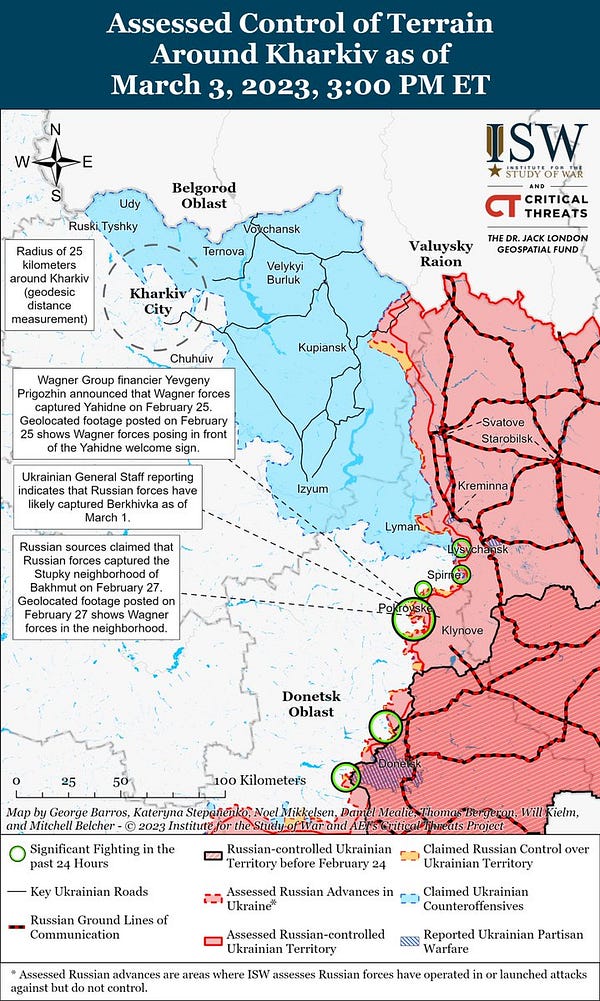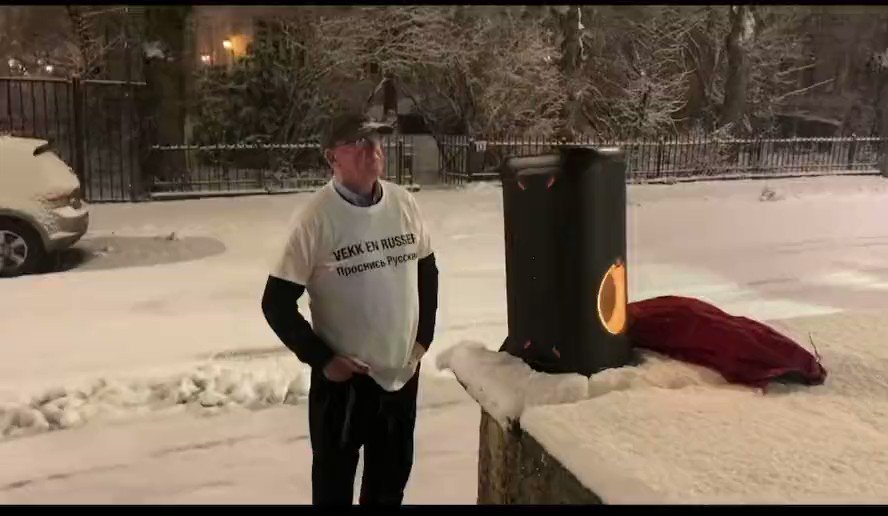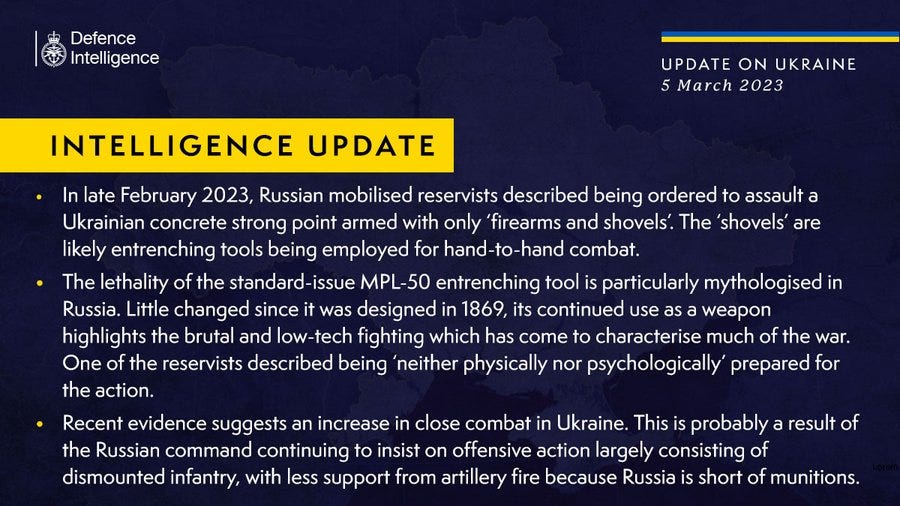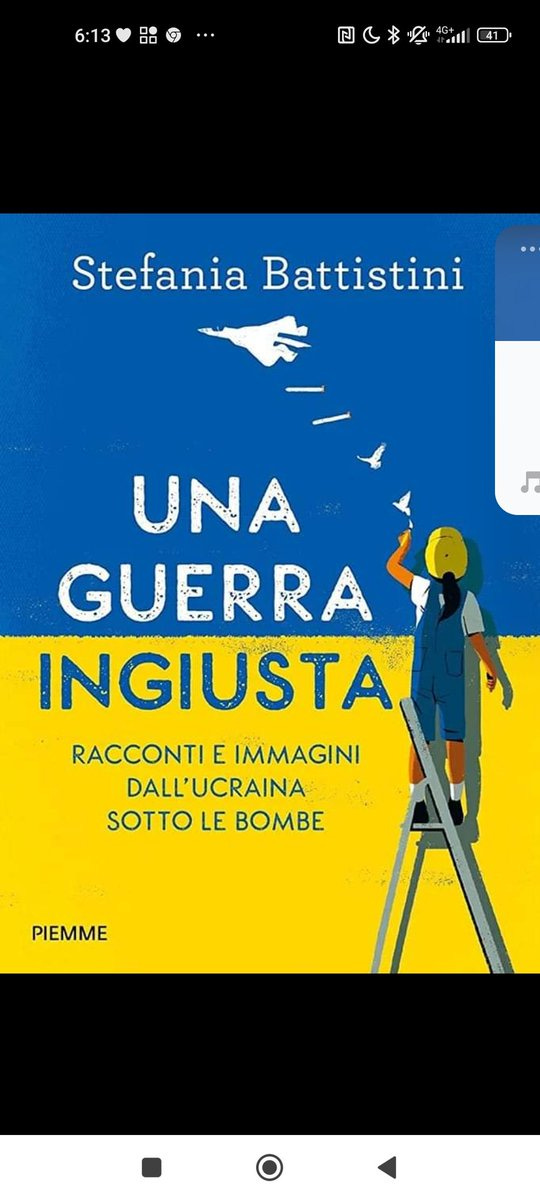Mar 5: Sunday Stories
Day 375: Bakhmut Kherson 10KRUsurrender Tinkoff Belgorod drones Botikov Ryodan Scholz EU Naftogaz Transnistria A&Ps UKDef ISW DarthPutin WomenToFollow Battistini Seddon Beaumont CEPA Mishchenko Fareed
Catching up…
EA Worldview’s Ukraine Up-date- hop over to Scott’s amazing hourly Ukraine up-date page. I’ll fill in with some bits and bobs.

Stories we’re following…
Ukrainian resupply routes out of besieged Bakhmut are becoming “increasingly limited”, according to the UK Ministry of Defence. In its latest intelligence update, the MoD tweeted that Kyiv is “reinforcing the area with elite units” and destroying key bridges, but Russian forces are making further advances.
A spokesperson for the Ukrainian Armed Forces has said denied claims of a mass withdrawal of Ukrainian troops in Bakhmut. Serhiy Cherevatyi, the spokesperson for the eastern grouping of the armed forces told CNN:
The fighting in Bakhmut is more on the outskirts, with the city controlled by Ukrainian defence forces: the Armed Forces of Ukraine, the Border Guard and the National Guard. There is also no mass withdrawal of Ukrainian troops.”
ISW: Ukrainian forces appear to set conditions for controlled fighting withdrawal from parts of Bakhmut. Geolocated footage posted on March 3 confirms that Ukrainian troops have destroyed two critical bridges in the Bakhmut area — one across the Bakhmutivka River in northeastern Bakhmut and one along the Khromove-Bakhmut route just west of Bakhmut, the Institute for the Study of War said in its latest update.
General Staff: Russian proxies in occupied parts of Kherson Oblast forcibly move 200 residents for 'filtration.' The "filtration measures" are interrogation procedures conducted by Russian forces with civilians on occupied Ukrainian territories, which may lead to torture and kidnapping.





Nearly 10,000 Russian soldiers surrender via 'I want to live' hotline since its creation. Launched in September 2022 by Ukraine's Main Directorate of Intelligence, the 24-hour hotline allows Russians to willingly surrender themselves or their units to the Ukrainian army.
Russia will take measures to prevent border incursions from Ukraine following an alleged deadly attack by Ukrainian “saboteurs,” the Kremlin said Friday. Kremlin spokesman, Dmitry Peskov, said that the Kremlin does not yet plan to introduce martial law in Russia’s border regions in response to the attack. Putin plans to discuss the attack at Friday’s scheduled meeting of the Russian Security Council, Peskov said.
Tinkoff Bank suspends currency transfers to Georgia one week after coming under E.U. sanctions. The bank’s app has also disappeared from the App Store.


The Moscow Times: Dozens of Russian media outlets, NGOs and activist groups forced into exile because of the Ukraine war have come up with innovative ways to maintain links to audiences left behind in Russia — and establish new audiences abroad.
Russian companies should buy air defense systems (air defense) to fight drones, since the funds of the Ministry of Defense “are focused on covering important state and military facilities,” said Andrey Kartapolov, head of the State Duma Defense Committee. “There are fairly inexpensive means of combating unmanned aerial vehicles that every self-respecting corporation can purchase and put on their facilities,” he explained.


Andrey Botikov, one of the creators of the Sputnik V vaccine against COVID-19, was reportedly killed in north-west Moscow, during a domestic dispute. Botikov was an employee of Moscow’s Gamaleya National Center for Epidemiology and Microbiology. An employee of Moscow’s Investigative Committee reports that in an apartment in north-west Moscow, a 29-year-old guest argued with the apartment’s owner and then strangled him with a belt.
The viral popularity of a newly emerged Russian subculture has in little more than a week caught the Kremlin’s eye and unsettled the authorities to such a degree that shopping malls in several major Russian cities have seen mass arrests of teenagers in the past few days. In making the arrests, law enforcement officials are believed to have been looking for anyone identifying themself with an amorphous grouping known as PMC Ryodan, which top government officials have claimed is a Ukrainian project aimed at destabilizing Russia.
President Biden is due to meet the Chancellor Scholz as part of continuing efforts to keep the US and Europe aligned in their defence of Ukraine. It will be a working visit to the White House for Chancellor Scholz. No press conference has been planned for the meeting on Friday afternoon and the chancellor will reportedly not be bringing press with him. A senior administration official predicted it would be short but intense. “Without question, they’re going to talk about the kinds of capabilities that Ukraine continues to need in the weeks and months ahead,” the US national security council spokesperson, John Kirby, said.


Ukraine appeals to EU to provide 250,000 artillery shells per month. In a letter obtained by the Financial Times, Ukraine's Defense Minister Oleksii Reznikov appealed to his counterparts in the 27 member states on March 3 to provide Kyiv with 250,000 artillery shells a month to ease a critical shortage that limits the country's progress on the battlefield.
European Parliament President Roberta Metsola visits Ukraine. Roberta Metsola returned to Ukraine on the evening of March 3 for her second visit to the country since the beginning of the full-scale invasion.

It would be an absolute "red line" if China provided weapons to Russia, a senior European Union official, who was not identified, said on March 3, adding that the EU would respond with sanctions. The comments echo remarks by German Chancellor Olaf Scholz a day earlier that warned Beijing against providing such aid to Moscow as it continues to fight in Ukraine. "Don't deliver any weapons to the aggressor Russia," Scholz said in a speech to the German parliament.



The Kyiv Independent reports that German arms manufacturer Rheinmetall is in talks with Ukrainian officials about building a tank plant in Ukraine, citing a report in the magazine Der Spiegel. According to the company’s boss, Armin Papperger, a plant could be set up in Ukraine for around 200 million euros and could produce up to 400 Panther-type main battle tanks annually. Papperger described the talks with the Ukrainian government as “promising” adding that he hoped for a decision “within the next two months”.
Estonia is holding a general election on Sunday that will determine whether it can sustain its high level of support for Ukraine. Prime Minister Kaja Kallas, 45, has emerged in the past year of war as one of Europe’s most outspoken supporters of Ukraine.

Court of Appeals annuls decision not to prosecute former Naftogaz CEO. Ukraine's Court of Appeals of the Chamber of Commerce on March 1 annulled the High Anti-Corruption Court's decision to rule against arresting former Naftogaz CEO Andriy Kobolev.
Kyiv Independent journalists receive award for investigation into International Legion. The Kyiv Independent's Anna Myroniuk and Alexander Khrebet received the #AllForJan Award in Warsaw on March 2 for investigating alleged leadership misconduct in the Ukrainian army's International Legion.

Ukraine is moving towards opening an office of the international criminal court as Kyiv seeks to establish a special tribunal to prosecute the leadership in Moscow. Andriy Kostin, Ukraine’s top prosecutor, told a justice conference in Lviv it will “allow the ICC prosecutor to more fully investigate international crimes committed in Ukraine”.
“However, there are currently no legal mechanisms that would allow the ICC to bring to justice for the crime of aggression those who planned and launched this brutal and unprovoked war,” Kostin said.

Peter Beaumont, ‘People are scared’: Kupiansk fears city will fall to Russia for second time - The Guardian
Iryna Viktorivna is serving up free hot food to her neighbours from a trestle table set up in a snowy street in the eastern Ukrainian city of Kupiansk, ladling porridge and meatballs and cabbage salad.
The sound of artillery bounces across the shallow bowl in which the city stands, four or five shells a minute – sometimes more – fired by both Ukrainian and Russian gun crews.
Mostly the shells land far away, but sometimes they fall on the city. A little earlier, one killed a 63-year-old man and damaged a nursery and fire station.
In the queue waiting to be served is 60-year-old Natalia Ivanivna, wrapped up in a winter coat and scarf and carrying a stick.
Ivanivna says she could have been relocated earlier that day but has chosen to stay because she worries about her house being looted. She tells of her concern about the cities further to the south along the eastern front, Bakhmut and Vuhledar and others, that have already been reduced to rubble over months of fighting. “It could happen here,” she says.
Viktorivna interrupts to chide her: “Don’t be pessimistic!”

The situation in the Transnistrian region of the Republic of Moldova has always been difficult for a number of reasons. First, there are the so-called Russian peacekeepers, who have official status as a result of the 1992 agreement between the Republic of Moldova and Russia.
Second, there is the operational group of Russian troops guarding the ammunition depot in the village of Kolbasna. The latter troops were supposed to have been withdrawn in accordance with the decision of the OSCE summits of 1999 and 2001.
Plans for their withdrawal were even announced in 2003 by first deputy chief of Russia's Presidential Administration Dmitry Kozak, but those plans were canceled because Moldova did not sign Kozak's memorandum.
Third, the weapons in the depots in the village of Kolbasna belonged to the former 14th Soviet Army, which were exported from Eastern Europe and East Germany. There are about 20,000 tons of these arms.
Nothing is known about their condition and readiness for use, as the OSCE has not been permitted to visit there. The so-called Transnistrian army even has BM-21 Grad Multiple Launch Missile Systems in service, and it outnumbers Moldova's weapons.
The so-called Transnistrian army, their militia, the Ministry of State Security, and border guards comprise around 6-8 thousand people in addition to 2,000 Russians, 500 peacekeepers, and 3,000 troops from the Russian operational group.
Moldova is lucky not to share any borders with Russia. The transfer of Russian troops to Transnistria is unlikely, due to the fact any such transfer would have to cross either NATO (Romanian) or Ukrainian air space, and Ukrainian air defense has strengthened.
The population of Moldova is polarized. About half of the population believes in Putin and supports Russia. In this context, it is not difficult to inflame public sentiment for the overthrow of Dorin Recean's government or the presidency of Maia Sandu.
Among the scenarios considered were the capture of state structures and the resignation of the pro-presidential government and the holding of snap elections.
This was Russia’s bet. According to the results of the poll, the presidential faction would still remain the largest in the parliament, but would not have a majority, Elon Sor's party and the socialist-communist bloc would have the opportunity to form a coalition.
Moldova is a parliamentary republic, and if a government is formed in parliament that is unfriendly to the president, the president becomes an ornamental figure.
Historically, Moldova’s strongest presidents were those who had a parliamentary majority: Voronin, who had a communist majority; Dodon, who had a socialist majority; and Sandu.
The Republic of Moldova has neutrality enshrined in its constitution, and amending the Constitution requires a ¾ vote in the parliament, which Maia Sandu does not possess. She has 62 out of 101 deputies - that's ⅔ but not ¾.


Kateryna Mishchenko is a Ukrainian author, and this morning we have an adapted text of her closing address at Debates on Europe 2023 in which she asks does Europe want Ukrainians as living partners or dead heroes?
Even before Russia’s full-scale invasion, I often heard people refer to Ukraine as Europe’s back yard. Now it resembles a graveyard, the war itself a gravedigger – missiles and shells form huge pits, digging graves for Ukrainians themselves. This cemetery is planted with beautiful flowers – notions of unbreakability, courage and resilience, which should give hope, the promise of rebuilding and that life is possible after all the horror.
A few weeks ago, I crossed the border between Ukraine and the European Union. Today there are no fast connections to or from Ukraine. The long journey has its own logic: the mental transformation takes time. In order to move from peace to war or from war to peace, one has to travel through a process, out of accelerated time – where the countdown applies not to seconds, but to human lives – into a time where there is room for reflection and discussion (sometimes just the wasting of words) and, most importantly, where there is time for choice. This mental metamorphosis creates anxiety, fear, disrupts sleep and deprives you of the most basic confidence in the ground under your feet, even when this ground is no longer dug up by shells and grave shovels. The borderline is felt as a kind of mental disorder.
Perhaps the current Nato strategy of supporting Ukraine in doses can be viewed through the prism of the fatal political logic of the borderline. The repressed can wait. But for how long?


Fareed’s Global Briefing: What Do Russians Think of Putin’s War?
Russian President Vladimir Putin’s war on Ukraine has been bad for his country in many ways—but what do Russians think of it?
Perhaps most importantly, it’s hard to know. Public opinion is difficult (if not impossible) to assess in authoritarian countries where speech isn’t free. In Russia, for instance, it’s illegal to call Russia’s war a “war”—official parlance deems it a “special military operation”—so any pollster’s question about the war will be corrupted, at least partially. But in a paper for the Brussels-based Egmont Institute, Joris Van Bladel examines public support for Putin himself, as collected by the independent Levada Center (and less trustworthy, Kremlin-aligned outfits) and finds Putin’s approval rating to be very high. Currently, Levada rates Putin’s approval at 83%; polling experts differ on whether to take such a figure literally, in Russia’s authoritarian context, Bladel notes.
Putin’s reported approval rose with his seizure of Crimea from Ukraine in 2014 and again with his full-scale invasion of Ukraine in February 2022, Bladel writes, concluding war makes Putin more popular. (Then again, given Putin’s public attempts to rally Russians around his war effort, one can ask if any poll respondents were simply following his cues.) Concerningly, New York Times reporter Valerie Hopkins told Fareed on Sunday’s GPS that war casualties seem to be making some Russians more supportive of Putin’s war, not less.Bladel sorts Russians into three categories: pro-war, anti-war and “conformists” who express no strong opinion. So (roughly) does Russian sociologist and political philosopher Greg Yudin. In a recent Foreign Affairs essay, Joshua Yaffa wrote that Yudin “said he has been impressed by friends and colleagues who, at great risk, have refused to remain silent or make compromises. But he is also alarmed by the number of people who admit that the war was a terrible mistake yet say that now Russia has no choice but to win it.”
Programming note…
For Italian readers…
Stefania Battistini is one of Italy’s experienced war reporters. She has been travelling to Ukraine since early February 2022, including the Battle of Kherson and now Bakhmut.







